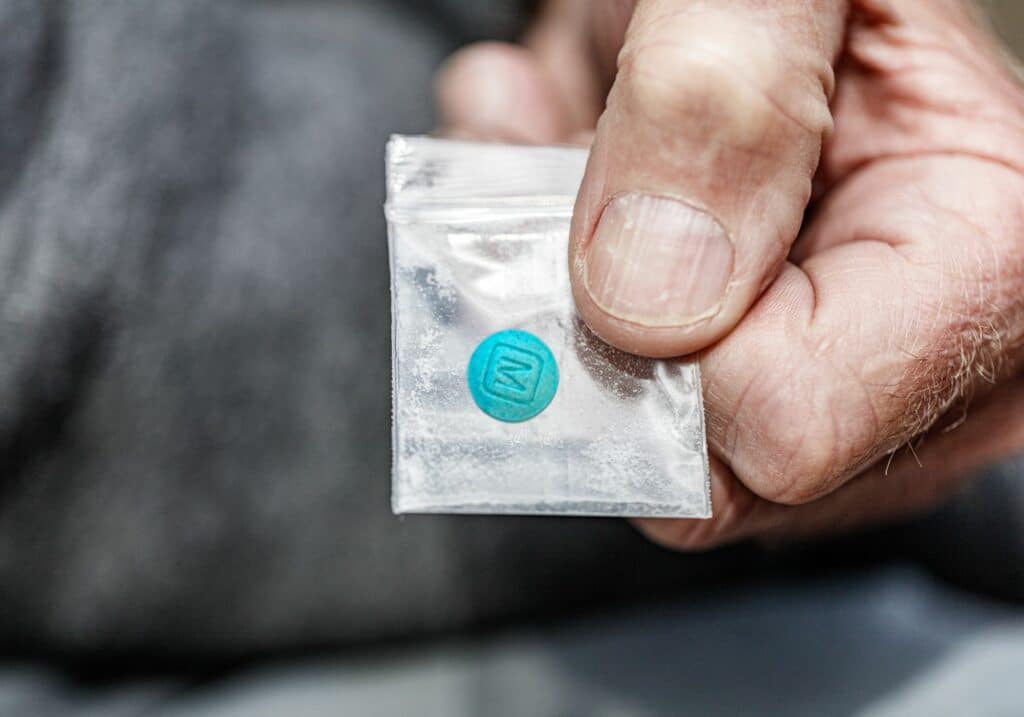Fentanyl, a powerful opioid, is often disguised under street names that conceal its dangerous nature. It’s known by various names, including:
- Apache
- Dance Fever
- Friend
- Goodfellas
- Jackpot
Despite these seemingly innocuous names, fentanyl leads to severe consequences like financial troubles, damaged relationships, and ongoing substance abuse.
Prescribed for managing severe pain or for sedation in medical procedures, fentanyl use can quickly spiral into addiction, transforming controlled treatment into a disruptive and harmful pattern.
Dealing with opioid dependence includes confronting withdrawal symptoms, which vary based on factors like usage frequency and duration. This guide delves into the challenges of fentanyl withdrawal and detox, providing insights into the treatment options for fentanyl addiction in Chattanooga, TN.
Fentanyl Withdrawal Signs
Being able to identify the early signs of fentanyl withdrawal is crucial for effectively managing the detox process. Recognizing these symptoms allows individuals and their support networks to seek the necessary help in a timely manner. Here’s a look at the initial signs that might indicate the beginning of fentanyl withdrawal:
- Intensifying Drug Cravings: A growing need for fentanyl, characterized by a compelling urge to use the drug, often signals the start of withdrawal.
- Mood Fluctuations: As the body adjusts to the absence of fentanyl, notable changes in mood, such as increased irritability, restlessness, or anxiety, may arise.
- Physical Symptoms: Early stages of withdrawal might present mild physical discomforts like muscle aches, headaches, or gastrointestinal issues as the body starts to adapt to a fentanyl-free existence.
- Sleep Disruptions: Changes in sleep patterns, including insomnia or restless sleep, can be early signs of withdrawal from fentanyl.
- Frequent Yawning: One of the initial physical indicators of fentanyl withdrawal is excessive, uncontrollable yawning.
As the withdrawal process progresses, these symptoms can intensify, underscoring the importance of prompt medical intervention and access to the right treatment resources. If you or a loved one is showing signs of fentanyl withdrawal, it’s essential to reach out to healthcare professionals or addiction treatment specialists for support and guidance during this challenging time.
Withdrawal from fentanyl, a potent opioid, results from the body’s adjustment to regular use of the drug. With consistent or high-dose usage, the body becomes dependent on fentanyl for normal function. Over time, this leads to a shift in the body’s chemical balance, creating a tolerance that requires increased dosages for the same effects. Stopping or significantly reducing fentanyl use triggers a phase of readjustment in the body, manifesting in various withdrawal symptoms.
Fentanyl Withdrawal Timeline
The journey through fentanyl withdrawal is unique for each individual, but a common pattern often emerges.
Here’s what you can typically expect during the fentanyl withdrawal process:
- 8-24 Hours After Last Dose: You may start to notice initial mild withdrawal symptoms.
- 1-2 Days Later: Symptoms intensify, often resembling severe flu symptoms.
- Around Day 3: Withdrawal symptoms usually peak during this time.
- 5-7 Days Into Withdrawal: Symptoms generally start to subside, and you might begin feeling a return to normalcy.
It’s important to realize that while the physical symptoms of fentanyl withdrawal tend to subside within a week, cravings can persist for a longer period. Ongoing support from a professional recovery center is crucial as you work through the more extended aspects of your recovery journey.
If you or someone you care about is experiencing fentanyl withdrawal, getting professional medical help and support is crucial. This step ensures a safer and more effective journey through the withdrawal process, providing necessary assistance every step of the way.
Fentanyl Withdrawal Symptoms
Withdrawal from fentanyl, a potent opioid, typically involves a range of symptoms, which are generally divided into two categories: common and severe.
Common Fentanyl Withdrawal Symptoms:
- Anxiety
- Restlessness
- Insomnia
- Muscle and Bone Pain
- Stomach Cramps
- Nausea and Vomiting
- Diarrhea
- Sweating, Chills, and Goosebumps
- Runny Nose
Severe Fentanyl Withdrawal Symptoms Include:
- Dehydration
- Fever
- Increased Heart Rate and Blood Pressure
- Strong Cravings for Fentanyl
- Depression
- Irritability
- Mood Fluctuations
- Seizures
Given fentanyl’s potent pain-relieving properties, dependence can develop swiftly, posing significant challenges to those attempting to stop its use. Abrupt discontinuation, commonly referred to as going ‘cold turkey,’ can be particularly distressing and unmanageable due to the severe withdrawal symptoms. Consequently, it is highly recommended to undergo withdrawal under the supervision of medical professionals in a controlled setting. This ensures both safety and effectiveness in managing the withdrawal process.
How Long Does Fentanyl Withdrawal Last?
The fentanyl withdrawal timeline can vary significantly from person to person. In general, symptoms start about 12 hours after the last dose is taken. The initial days are usually the toughest, with the acute phase of withdrawal potentially spanning several weeks. The individual’s health history significantly influences how their body handles each stage of withdrawal.
Initial Phase of Withdrawal
The path through fentanyl withdrawal is complex and can be drawn out. Symptoms typically emerge within 12 hours post the final dose, reaching a peak in intensity between the first and third day. This period can be incredibly challenging, but with time and proper management, the symptoms gradually subside.
Attempting to go through fentanyl withdrawal without medical guidance is risky. The process can be dangerous and even life-threatening if not handled in a controlled, medically supervised setting.
Acute Withdrawal Phase
This stage usually begins a few days to a week after stopping fentanyl use. It’s during this time that the most intense physical symptoms arise. Emotional support and professional medical advice are essential during this phase, especially from experts familiar with opioid withdrawal and addiction.
Long-Term Withdrawal Stage
In this stage, some physical withdrawal symptoms may continue, while psychological symptoms like cravings, sleep issues, irritability, and anxiety can linger. The length of this phase varies greatly among individuals, lasting weeks or even months for some, and up to a year for others on their recovery path.
Factors Affecting the Withdrawal Timeline
Several personal factors can influence the fentanyl withdrawal process:
- Dosage: The amount of fentanyl used plays a significant role in the intensity of withdrawal. Higher doses usually lead to more severe symptoms.
- Duration and Frequency of Use: The more extended and frequent the use, the more the body gets used to fentanyl, potentially lengthening the withdrawal period.
- Age: Younger people often process substances quicker than older individuals, which can impact the length of withdrawal.
- Physiology: Genetic factors affect how opioid receptors respond to fentanyl, influencing withdrawal severity.
- Mental Health: Individuals with mental health conditions may find stopping substance use more challenging. Managing withdrawal symptoms without professional support can be particularly difficult for them.
Fentanyl Detox and Withdrawal Treatment
Detoxification, or medically managed withdrawal, is an essential process that ensures safety and comfort as an individual’s body rids itself of fentanyl and other substances. This crucial step, usually the first in a comprehensive treatment plan, is pivotal in beginning the journey to recovery from opioid dependence.
Typically, undergoing a medical detox from opioids like fentanyl is the foundational step in a broader treatment strategy. While detox is a critical start, it’s often not sufficient on its own for long-term recovery. It sets the stage for a more in-depth approach to treatment.
This treatment is personalized based on each individual’s needs and the severity of their opioid use disorder. It adopts a holistic approach, covering various facets of the individual’s life. This comprehensive treatment includes evidence-based behavioral therapies, personal and group counseling, and medication-assisted treatments, all designed to foster sustained recovery well beyond the detox and withdrawal phases.
Duration of Fentanyl Detox
The time needed to detox from fentanyl varies from one person to another. The severity of withdrawal symptoms can depend on factors like the dosage, frequency, and duration of fentanyl usage, as well as the drug’s potency.
Medications Used in Fentanyl Detox
Effectively managing withdrawal symptoms and controlling cravings is possible through the use of certain medications. Healthcare providers may prescribe these medications to not only ease withdrawal symptoms but also for long-term use in managing cravings, maintaining opioid abstinence, and reducing the risks of overdose. These include:
- Methadone: This opioid agonist activates the same brain receptors as fentanyl but without producing a high. When used as prescribed, methadone can effectively block cravings and mitigate withdrawal symptoms.
- Buprenorphine: A partial opioid agonist, buprenorphine binds to the same receptors as fentanyl but with limited activation. This helps in reducing withdrawal symptoms and cravings.
- Lofexidine Hydrochloride: Approved by the FDA in 2018, this non-opioid medication can lessen the severity of withdrawal symptoms, facilitating the discontinuation of fentanyl use.
Understanding these aspects of fentanyl detox and withdrawal treatment is key to embarking on a safe and effective path towards recovery.
Fentanyl Withdrawal Frequently Asked Questions
How Long Does Fentanyl Withdrawal Last?
The duration of fentanyl withdrawal can vary, but it commonly lasts between one to two weeks. Factors influencing the length and intensity of symptoms include the individual’s history of fentanyl use, the dosage levels they were accustomed to, and their overall health condition.
Can You Die from Fentanyl Withdrawal?
While fentanyl withdrawal itself is not typically life-threatening, it can present extreme challenges. Abruptly stopping fentanyl use can trigger severe withdrawal symptoms or lead to relapse. Secondary complications like dehydration can pose significant health threats. Therefore, accessing professional medical assistance during withdrawal is vital to safely manage these risks.
Are There Permanent Side Effects of Fentanyl Withdrawal?
The longevity of withdrawal symptoms can differ among individuals. Some may find relief within a few weeks, while others might experience prolonged symptoms, particularly if there are pre-existing health or mental health conditions.
What Is Fentanyl Withdrawal Trauma?
Chronic fentanyl use can cause changes in brain function, leading to an extended period of recovery from the acute symptoms of withdrawal. This extended recovery period is often referred to as ‘withdrawal trauma.’
How Many People Have Died from Fentanyl Overdoses?
Based on data from the National Institute of Health, there were 70,601 reported deaths related to fentanyl overdoses in the year 2021.
What Is the Origin of Fentanyl?
Illicitly manufactured fentanyl and similar substances have been circulating since around 1979. The current fentanyl epidemic has a global reach, with the majority of street fentanyl being produced in Mexico, often using chemicals sourced from China.
What Are the Risks of Combining Fentanyl with Other Opioids?
When fentanyl is mixed with other opioids, such as prescription pain medications or heroin, the risk of overdose is greatly amplified due to the combined potent effects of these substances.
Fentanyl Withdrawal Treatment at Iris Wellness Group
Iris Wellness Group is a haven for those fighting fentanyl addiction in Chattanooga, TN. Our Fentanyl addiction treatment center offer a nurturing environment conducive to recovery.
Our compassionate Fentanyl outpatient program offers Fentanyl outpatient detox in Chattanooga, TN, ensuring a safe and effective detox process. Once free from addictive substances, you can seamlessly transition into one of our specialized outpatient treatment programs at Iris Wellness Group, designed to address substance use disorders:
- Outpatient Detox: Combines the convenience of living at home with the effectiveness of regular treatment sessions, ideal for integrating recovery with your everyday life.
- Outpatient Rehab: This program is really flexible, designed to work around your daily schedule.
- Partial Hospitalization Program (PHP): It’s structured but you don’t have to stay overnight. It’s like getting intensive treatment during the day while you live at home.
- Intensive Outpatient Program (IOP): This one offers deeper, more focused care but still lets you keep up with your everyday responsibilities.
- Dual Diagnosis Treatment Program: This is specially for people who are dealing with both addiction and mental health issues at the same time.
Our Fentanyl treatment programs incorporate a variety of interventions:
- Medication-Assisted Treatment (MAT): This uses medicines to help reduce withdrawal symptoms and the urge to use opioids.
- Psychotherapy: This is all about tackling the mental and emotional factors that play a part in addiction by using CBT or DBT.
- Group Therapy: Here, you’ll get support and learn with others who are going through similar experiences.
- Individual Therapy: You’ll get one-on-one support that’s tailored just for you.
- Family Therapy: This helps fix and strengthen your relationships with family, which is super important.
- Holistic Therapies: These focus on improving your overall health – body, mind, and spirit.
- Aftercare: We’ll keep supporting you even after your treatment is over.
Begin your path to recovery with Iris Wellness Group. Our experienced team is here to guide and support you. For more information or to start Fentanyl addiction treatment, reach out to our admissions team at 423-460-9766.













